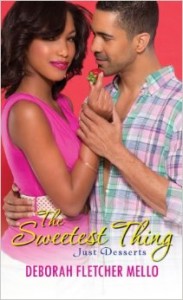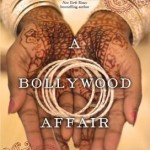 I decided to read The Sweetest Thing by Deborah Fletcher Mello at random, out of sheer irritation. It was a good choice. There’s a lot to unpack here, both in terms of the book and in terms of how we read. While I liked The Sweetest Thing far more than LizMc2 did, she touches on something I’ve been contemplating since MerrianOW brought me up short. The genre rules we instinctively expect are not universally relevant. WASP hang-ups about sexuality are not culturally relevant if the characters are black Southern Baptist. While we (and by we I reference the white American reader) easily accept unfamiliar terms or language combinations in historical stories, we reject them in Contemporary Romance. It’s important to recognize that this impulse is the result of cultural privilege. Unlike LizMc2, I am not sure I will be reading the second book of this series, although I would absolutely read another book by Deborah Fletcher Mello. At the end of The Sweetest Thing Mello introduces the heroine of her next book. In doing so she confuses Hijab with Niqab. This is pretty basic, similar perhaps to confusing a hat with a mask. (“She wore a hat, leaving only her eyes visible.”)
I decided to read The Sweetest Thing by Deborah Fletcher Mello at random, out of sheer irritation. It was a good choice. There’s a lot to unpack here, both in terms of the book and in terms of how we read. While I liked The Sweetest Thing far more than LizMc2 did, she touches on something I’ve been contemplating since MerrianOW brought me up short. The genre rules we instinctively expect are not universally relevant. WASP hang-ups about sexuality are not culturally relevant if the characters are black Southern Baptist. While we (and by we I reference the white American reader) easily accept unfamiliar terms or language combinations in historical stories, we reject them in Contemporary Romance. It’s important to recognize that this impulse is the result of cultural privilege. Unlike LizMc2, I am not sure I will be reading the second book of this series, although I would absolutely read another book by Deborah Fletcher Mello. At the end of The Sweetest Thing Mello introduces the heroine of her next book. In doing so she confuses Hijab with Niqab. This is pretty basic, similar perhaps to confusing a hat with a mask. (“She wore a hat, leaving only her eyes visible.”)
The Sweetest Thing suffered from a slow start, not gaining much traction until I was about a third of the way in. Harper comes from a financially solid family and runs a successful business of her own. There are no male father figures in her life, hers is a world of women. It’s relevant only in how Harper deals with her father’s death, because one way The Sweetest Thing absolutely follows genre conventions is to set Harper adrift in another world. Harper is quickly absorbed by Quentin’s life. I found how easily she surrenders her own roots difficult to accept. Quentin is one of two brothers Harper’s father fostered sometime after abandoning her. Elliott, Harper’s father, is largely given a free pass for his actions. Because he was a good father to Quentin and Troy he is seen as a good man. Harper’s deceased mother is presented as a flawed and unforgiving woman, shouldering the blame for Harper’s adult rejection of her father. Harper is ordered by her grandmother to attend her father’s burial. I was uncomfortable with the burden placed on Harper here. Her grandmother is an adult who could have maintained a relationship with Harper’s father. Harper’s father could have been more assertive in his desire to know her. Harper was an abandoned child who grew into a self-protecting adult. The burden is laid on Harper to the end, with the focus remaining on what she lost by not knowing her father instead of on what he cost her by not being present. I appreciated not painting Harper’s father as an evil man, but I wanted someone (anyone!) in the plot to stop making him into a long-suffering saint. The closest we came was Quentin discussing Elliott’s philosophy of putting sad times out of your mind so you can hold the happy ones.
Harper and Quentin were a believable couple. Both work long hours, both are driven to succeed. Both feel the loss of stable parents in their lives, with Quentin having had Harper’s father and Harper having had her maternal grandmother. (No mention is made of an extended family for Elliott. Given Elliott’s penchant for secrecy it’s possible that Harper has any number of lost relatives.) The Sweetest Thing is interesting in it’s depiction of consent. Harper takes non-consensual photos of Quentin and uses them as stroke-spiration. While she later feels guilt and deletes them, it’s too late and too little for me as a reader. Additionally, the subplot of Rachel and Dwayne overpowers the main couple. Dealing with rough sex, degradation, domestic violence and unplanned pregnancy, it’s a complex story for two background characters. I don’t believe that this couple can make it work, and neither do those around them. The choice to forgive, hope and pray mirrors what often happens when an outwardly capable woman is in a dysfunctional relationship. Because of the child, there is no one stepping forward to suggest that perhaps these two are toxic together. Also because of the child, the burden is laid on Rachel to leave if things go wrong again. Rachel has been involved with Dwayne since she was thirteen. She needs a level of protection no one is stepping forward to offer her. The book’s faith in therapy and time helping Dwayne change is a sadly familiar one.
“It’s not like that.” Rachel insisted. “It’s always like that, baby.” – The Sweetest Thing, Deborah Fletcher Mello
Troy, the other brother in Harper’s father’s home, is too distant. He’s happy to introduce this newfound sister to their father’s life and accord her the respect her DNA and Elliott’s will suggest is her due. He felt like an adult plot moppet to me, another reason I’m not eager to pick up his story. The Sweetest Thing also dabbles in a quickly abandoned attempt at dialect. I never need to see “dat” and “dose” in a book unless we’re discussing digital audio tape and children’s Tylenol. This is a me thing, which may not be a you thing, but having read extensively in early 1900’s fiction it sets my back up. Mello also has a very clunky hand with her sex scenes. (I’m a skimmer under the best of circumstances but when your “feminine spirit” is tinging I’m skimming twice as fast.) With a stronger start and a stronger conflict between the leads The Sweetest Thing could have been a top read for me. It was still a solid B+ and I’m inclined to try another by Deborah Fletcher Mello.
*This post originally appeared at Love In The Margins.















